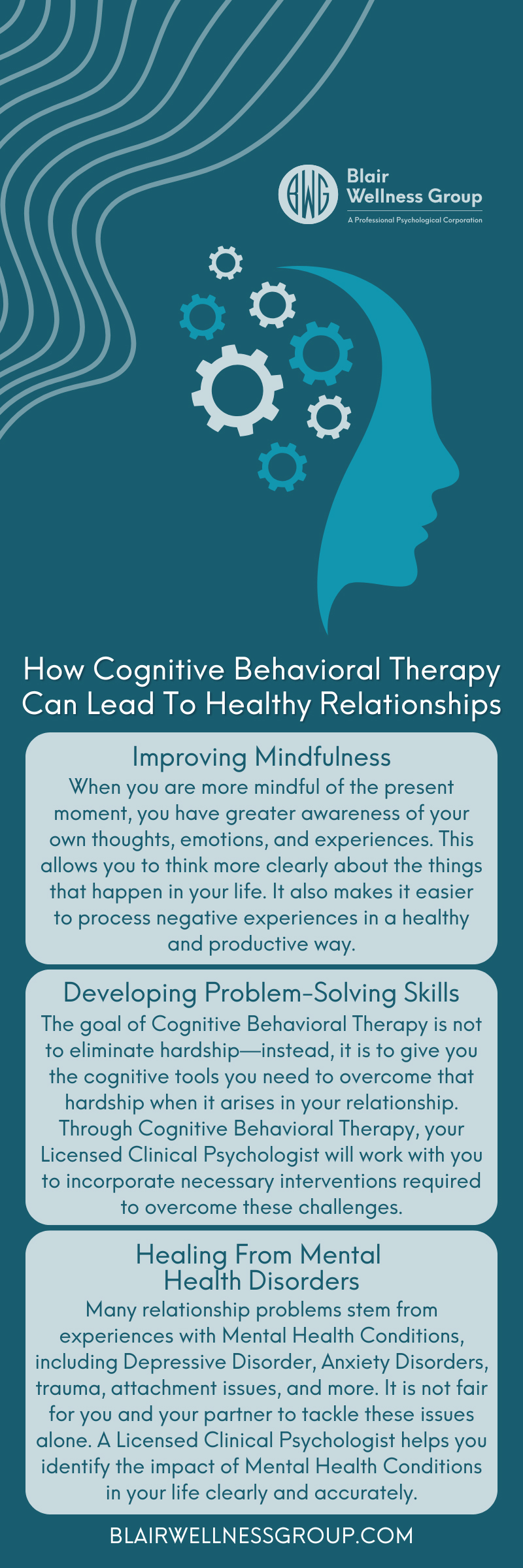Cognitive Behavioral Therapy, or CBT, plays a big role in modern therapy plans. Many individuals who work with a Licensed Clinical Psychologist end up trying Cognitive Behavioral Therapy as part of their treatment plans. This form of Psychotherapy revolves around collaborating with your Licensed Clinical Psychologist to identify, address, and correct irrational or negative thought patterns that affect your emotions and actions.
Cognitive Behavioral Therapy is best known for its use in treating Mental Health Disorders, Mood Disorders, Personality Disorders, and Addiction Issues. However, its benefits go far beyond diagnosable conditions. Seeking intervention from a skilled, Licensed Clinical Psychologist to get a proper diagnosis and treatment plan, such as evidence-based treatment models and scientific approaches, including Cognitive Behavioral Therapy, can help you in all aspects of your personal and professional life. This extends to your romantic partnerships and relationships. Read on to learn more about how Cognitive Behavioral Therapy benefits relationships and see how you can make positive changes in your life with a Licensed Clinical Psychologist.
Cognitive Distortions and Relationships
The objective of Cognitive Behavioral Therapy is to help patients recognize and correct maladaptive thought patterns and dysfunctional ways of interacting in relationships. In addition to influencing your thoughts, emotions, mood, and behavior, cognitive distortions impact your relationships in a negative way. They make it difficult to clearly analyze problems, communicate openly with others, and find productive and healthy solutions for yourself and the circumstances you are in.
Below are a few examples of cognitive distortions that Cognitive Behavioral Therapy can help you overcome.
Personalization and Blaming
Personalization is the belief that everything in your life stems from others being against you or coming after you, which, in turn, can make you paranoid, angry, vindictive, and highly reactive. Personalization-based thinking informs you that others in the world are the cause of all your problems and only you can engage in corresponding actions or reactions to protect yourself from negative experiences in your life. Similarly, blaming involves feelings of shame for things that happen to you—including experiences that are out of your control.
In a relationship, these cognitive distortions make it difficult to assess, analyze, and evaluate problems clearly in order to respond and discern appropriately. Placing unnecessary blame on others makes it difficult to find realistic solutions or be able to adaptively overcome negative experiences.
It also affects your ability to communicate effectively and instead engage in passive-aggressive behavior or angry outbursts. This can lead to unhealthy patterns in relationships between you and your partner. Blaming others can also make it impossible for a partner to get through to you. These challenges make conflicts substantially more difficult and adversely impact the quality of your relationships.
Emotional Reasoning
Emotional reasoning occurs when your behaviors, decisions, actions, words, and thought patterns are dominated by the spectrum of your feelings, emotions, and impulses rather than facts and reasoning. These patterns of emotional reasoning and impulsive behaviors are detrimental to you and your relationships as a result of governing logic, rational, and reasoning skills. It leads to irrational decisions, impulsive behaviors, maladaptive interaction styles, and cognitive distortions, dominating your belief systems and values in life.
Overgeneralization
Overgeneralization includes distortions such as filtering and “black and white” thinking. Filtering refers to focusing on negative experiences in your life and ignoring positive experiences, which leads you to view your life as overall more negative than it actually is. “Black and white” thinking refers to the tendency of labeling people, experiences, or opinions as either completely good or completely bad. It eliminates nuance and leads to unrealistic beliefs and ideals.
Both of these cognitive distortions feed into overgeneralization. People who overgeneralize often view their personal experiences without nuance and turn them into universal beliefs that are false or even harmful. This distortion is what leads to problems such as stereotyping, unfair opinions, and false assumptions.
In a relationship, overgeneralization makes it difficult to communicate. If you cannot view a situation with a realistic and objective lens free from cognitive distortions, cognitive dissonance, past traumas, maladaptive thinking, and impulsivity, you become rigid and stuck in your own web of psychopathology, self-fulfilling prophecies, maladaptive beliefs, and repeated arguments. This rigidity leads to closed-off partners and tension in all relationship dynamics. It also makes it hard to approach problems clearly and openly, leading to excess conflict between you and others.
Identifying, Addressing, and Overcoming Negative Thought Patterns
Cognitive Behavioral Therapy benefits relationships by helping you identify these cognitive distortions whenever they impact your life. Your Licensed Clinical Psychologist will work with you to understand how your thought patterns affect your emotions and behaviors, as well as your relationships, conflicts, and personal goals.
Being able to see these negative thought patterns as they occur is half the battle. Through activities such as guided discovery and analyzing your inner voice, your Licensed Clinical Psychologist will help you recognize cognitive distortions and how they influence your mood and behavior. By utilizing scientific approaches and evidence-based treatment models, your Clinical Psychologist can intervene to help you overcome these thought patterns and restructure them into something more constructive, realistic, and positive.
Improving Mindfulness
Mindfulness practice is a key part of Cognitive Behavioral Therapy. When you are more mindful of the present moment, you have greater awareness of your own thoughts, emotions, and experiences. This allows you to think more clearly about the things that happen in your life. It also makes it easier to process negative experiences in a healthy and productive way.
Mindfulness also helps improve your presence in a relationship. When one partner is frequently lost in a moment or caught up in overwhelming emotions, it can be hard for the other to reach for, relate to, and support them. Mindfulness allows you to be more present both in the moment and in your relationship, creating a stronger dynamic between you and your partner.
Developing Problem-Solving Skills
No relationship comes without its challenges. The goal of Cognitive Behavioral Therapy is not to eliminate hardship—instead, it is to give you the cognitive tools you need to overcome that hardship when it arises in your relationship.
Through Cognitive Behavioral Therapy, your Licensed Clinical Psychologist will work with you to incorporate necessary interventions required to overcome these challenges. This can include everything from identifying negative thought patterns at the root of relationship conflict to addressing the cause of distortions, lack of social skills, poor insight or poor judgment, as well as treating your past traumas, Mental Health Disorders, Personality Disorders, poor cognitive processing of emotions, in order to help you overcome obstacles.
Healing From Mental Health Disorders
Many relationship problems stem from experiences with Mental Health Conditions, including Depressive Disorder, Anxiety Disorders, trauma, attachment issues, and more. It is not fair for you and your partner to tackle these issues alone. A Licensed Clinical Psychologist helps you identify the impact of Mental Health Conditions in your life clearly and accurately. Then, through Cognitive Behavioral Therapy and other evidence-based interventions, you can heal from these experiences and learn to overcome past challenges, as well as build the necessary cognitive skills to cultivate and maintain mental health and emotional well-being.
Blair Wellness Group Can Help
Cognitive Behavioral Therapy helps prevent challenges associated with Mental Health Disorders, maladaptive behaviors, insecure attachment, poor communication, and more from overtaking your life and your relationship. If you are looking for Cognitive Behavioral Therapy from a Licensed Clinical Psychologist, contact Blair Wellness Group to see how our evidence-based treatment plans can help you.

Dr. Cassidy Blair is a renowned Licensed Clinical Psychologist and trusted Performance Coach who specializes in providing Concierge-Psychological Care and Executive Coaching for high-achieving professionals. With a deep understanding of the unique challenges faced by CEOs, executives, entrepreneurs, and leaders, Dr. Blair offers tailored, confidential care designed to foster emotional well-being, personal growth, and professional excellence. Her clientele values her discretion, clinical expertise, and emotionally intelligent approach to navigating complex personal and professional dynamics.
- This author does not have any more posts.








